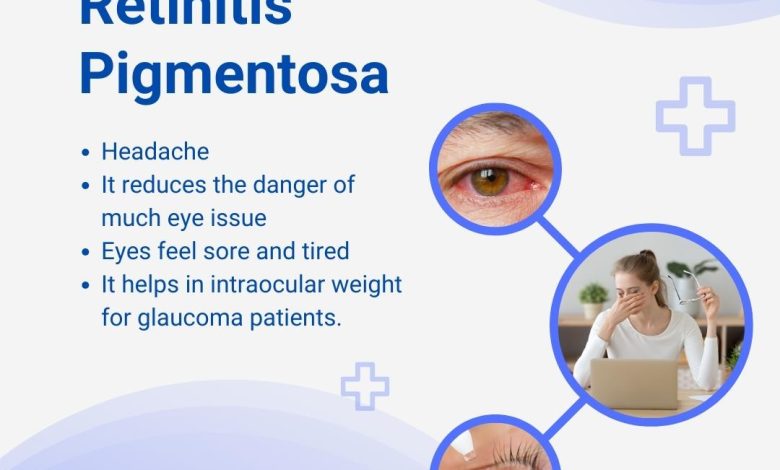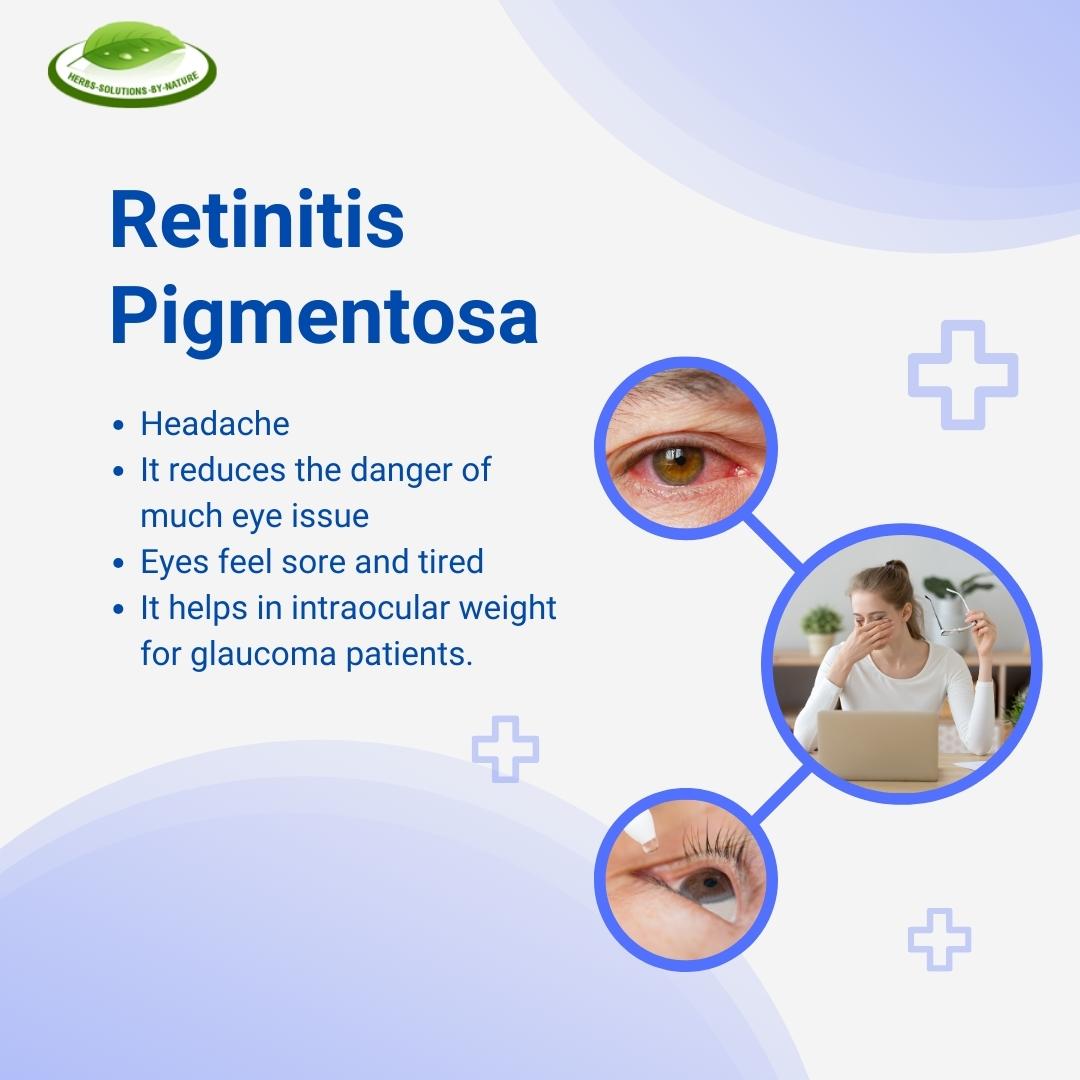Retinitis Pigmentosa The Benefits of Herbal Treatment

Retinitis Pigmentosa is a degenerative eye disorder that causes vision impairment and blindness. Despite the limited available treatments, there is hope in the form of herbal treatment for Retinitis Pigmentosa. Natural Treatment for Retinitis Pigmentosa have been found to slow down the disorder’s progression and improve vision. We will discuss the benefits of Natural Treatment for Retinitis Pigmentosa and the various natural remedies that can be used to treat this disorder.
Understanding Retinitis Pigmentosa
Retinitis Pigmentosa is a complex and progressive eye disorder that affects the retina, leading to vision impairment and, eventually, blindness. This condition is typically inherited and often diagnosed during adolescence or early adulthood. Understanding the intricacies of Retinitis Pigmentosa is crucial for individuals and their loved ones dealing with this condition.
Retinitis Pigmentosa is characterized by the gradual degeneration of the photoreceptor cells in the retina, which are responsible for capturing light and transmitting visual signals to the brain. This degeneration causes a gradual decline in peripheral and night vision, making it difficult for individuals to navigate their surroundings and perform daily activities.
While conventional treatment options such as vision aids, low vision rehabilitation, and genetic counseling can help manage the symptoms and provide support, they do not offer a cure. It is where Herbal Treatment for Retinitis Pigmentosa comes into play. By incorporating Natural Treatment for Retinitis Pigmentosa and supplements into their routine, individuals with Retinitis Pigmentosa may experience improvements in their overall eye health and well-being.
Eye supplements, such as vitamins A, C, and E, as well as omega-3 fatty acids and antioxidants, have shown promising results in slowing down the progression of the disease and preserving visual function. These supplements work by providing the necessary nutrients and antioxidants that support retinal health and protect against oxidative stress, which is believed to play a role in the progression of Retinitis Pigmentosa.
Understanding Retinitis Pigmentosa involves recognizing the importance of proactive measures and holistic approaches in managing this condition. Individuals with Retinitis Pigmentosa can improve their visual function and overall quality of life by integrating herbal remedies and Eye Supplements into their lifestyle. It is essential to consult with a healthcare professional or an herbalist to determine the most suitable and effective herbal treatment plan for individual needs.
Conventional Treatment Options
When it comes to treating Retinitis Pigmentosa, some conventional options are available. While they may not provide a cure, they can help manage the symptoms and improve overall well-being. One such option is the use of eye supplements. Eye supplements, such as vitamins A, C, and E, along with omega-3 fatty acids and antioxidants, have shown promising results in slowing down the progression of the disease and preserving visual function. These supplements provide nutrients and antioxidants that support retinal health and protect against oxidative stress. It’s essential to consult a healthcare professional to determine the right combination of eye supplements for your specific needs. Incorporating these conventional treatment options and herbal remedies can offer a holistic approach to managing Retinitis Pigmentosa and enhancing visual health.
Herbal Remedies for Retinitis Pigmentosa
Herbal remedies offer a promising avenue for treating Retinitis Pigmentosa and improving visual health. While research is ongoing, several herbs have shown a potential to support retinal health and slow disease progression. These Natural Treatment for Retinitis Pigmentosa provide essential nutrients and antioxidants that help protect the retina from oxidative stress and promote overall well-being. Some popular Herbal Treatment for Retinitis Pigmentosa include Ginkgo Biloba, known for its potential to improve blood flow to the eyes and enhance vision, and Bilberry Extract. This potent antioxidant may protect against retinal degeneration. Incorporating these herbal remedies into your lifestyle and conventional treatment options can offer a holistic approach to managing this condition and improving your overall quality of life.
Ginkgo Biloba – A Promising Herbal Treatment
Ginkgo Biloba is a promising herbal treatment for Retinitis Pigmentosa, offering potential benefits for individuals dealing with this condition. It contains powerful antioxidants that protect the retina from oxidative stress, a critical factor in the progression of Retinitis Pigmentosa. By incorporating Ginkgo Biloba into your Herbal Treatment for Retinitis Pigmentosa plan, you may experience improved visual function and a slowdown in the degenerative process. However, consulting with a healthcare professional or herbalist is essential to determine the proper dosage and potential interactions with any medications you may be taking.
Bilberry Extract – A Potent Antioxidant
Bilberry extract is a potent antioxidant with promising potential for individuals with Retinitis Pigmentosa. This Natural Treatment for Retinitis Pigmentosa has been gaining attention for its ability to protect against retinal degeneration and support overall eye health. Bilberry extract contains powerful antioxidants known as anthocyanins, which help neutralize free radicals and reduce oxidative stress in the retina. These compounds also have anti-inflammatory properties, which may help alleviate symptoms and slow down the progression of the disease. Incorporating bilberry extract into your herbal treatment plan may offer significant benefits, including improved visual function and a potential delay in the degenerative process. However, consulting with a healthcare professional or herbalist is essential to determine the proper dosage and ensure compatibility with existing medications.
Other Herbal Treatments for Retinitis Pigmentosa
In addition to Ginkgo Biloba and Bilberry Extract, other Herbal Treatment for Retinitis Pigmentosa show promise in managing Retinitis Pigmentosa. Saffron contains compounds with antioxidant and anti-inflammatory properties, helping protect the retina from damage. Another herbal treatment to consider is Green Tea, which is rich in antioxidants and has been shown to reduce oxidative stress in the eyes. Additionally, Milk Thistle, known for its liver-supporting properties. It may also benefit individuals with Retinitis Pigmentosa, as it can help cleanse the body of toxins that may contribute to the degeneration of retinal cells. It’s essential to consult a healthcare professional or herbalist to determine the most suitable Herbal Treatment for Retinitis Pigmentosa for individual needs.
Tips to Incorporate Herbal Remedies in Your Lifestyle
Incorporating herbal remedies into your lifestyle can be a beneficial way to manage Retinitis Pigmentosa and improve your overall eye health. Here are some tips to help you integrate Herbal Treatment for Retinitis Pigmentosa into your daily routine:
- They can help determine the most suitable herbal remedies for your needs and ensure compatibility with existing medications.
- Start with small doses: When incorporating herbal remedies, start with small amounts and gradually increase as recommended. It allows your body to adjust and reduces the risk of any adverse effects.
- Be consistent: Consistency is critical when using herbal remedies. Follow the recommended dosage and take them regularly to maximize their potential benefits.
- Combine with a healthy lifestyle: Herbal treatments work best when combined with a healthy lifestyle. Incorporate a balanced diet, regular exercise, and proper eye care practices to enhance the effects of herbal remedies.
- Monitor your progress: Keep track of any changes in your symptoms and overall eye health. It will help you determine the effectiveness of the Herbal Treatment for Retinitis Pigmentosa and make any necessary adjustments to your treatment plan.
By following these tips and working closely with a healthcare professional, you can effectively incorporate herbal remedies into your lifestyle and improve your vision and overall well-being. Remember, herbal treatments are not a substitute for medical advice, so always consult a professional before making any changes to your treatment plan.





